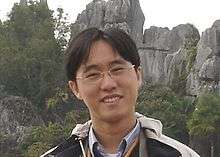George Tseng
George Chien-Cheng Tseng is a Biostatistican and Professor of Biostatistics, Computational & Systems Biology and Human Genetics at University of Pittsburgh Graduate School of Public Health.[1]
George Tseng | |
|---|---|
 | |
| Born | Chien-Cheng Tseng 1975 (age 44–45) Taoyuan, Taiwan |
| Alma mater |
|
| Known for | Meta-analysis of Omics data |
| Awards | Silver medal prize International Mathematical Olympiad (1993) |
| Scientific career | |
| Fields | |
| Institutions | |
| Thesis | Low-level Analysis, Supervised and Unsupervised Machine Learning, and Related Issues in Microarray Analysis (2003) |
| Doctoral advisor | Wing Hung Wong |
| Website | tsenglab |
Education
Tseng studied Mathematics at Bachelor of Science (1997) and Master of Science (1999) level, both at the National Taiwan University. He gained his ScD in Biostatistics from Harvard University in 2003, under the supervision of Wing Hung Wong.
Research
Tseng is leading a research group of Bioinformatics and Statistical learning at University of Pittsburgh. His group focuses on developing Meta-analysis and Machine learning tools to analyze Omics data, which uses resampling methods and Bayesian statistics extensively. Tseng has developed Tight Clustering,[2] a method for cluster genomics data with scattered genes, and Adaptively Weighted Fisher's method,[3] a method for Meta-analysis of studywise p-values with both consensus and differential results.
Awards and honours
Tseng has been awarded a silver medal prize in International Mathematical Olympiad in 1993[4]. He has been awarded Pittsburgh Statistician of the Year in 2017 by Pittsburgh Chapter of the American Statistics Association.[5] He became a fellow of the American Statistical Association in 2017[6]. He is selected as one of the recipients of the Provost’s Award for Excellence in Mentoring at University of Pittsburgh in 2019[7] .
Personal life
In 1995, Tseng was Baptized as a Christian in Taipei.[8] He is married and resides in Pittsburgh with six children.
References
- "Dr. George C Tseng, ScD". www.publichealth.pitt.edu/. Pitt. Retrieved 3 May 2017.
- Tseng, George C.; Wong, Wing H. (March 2005). "Tight Clustering: A Resampling-Based Approach for Identifying Stable and Tight Patterns in Data". Biometrics. 61 (1): 10–16. CiteSeerX 10.1.1.331.295. doi:10.1111/j.0006-341X.2005.031032.x. PMID 15737073.
- Li, Jia; Tseng, George C. (2011). "An adaptively weighted statistic for detecting differential gene expression when combining multiple transcriptomic studies". Annals of Applied Statistics. 5 (2A): 994–1019. arXiv:1108.3180. Bibcode:2011arXiv1108.3180L. doi:10.1214/10-AOAS393.
- "IMO 1993 Taiwan Contestants". www.imo-official.org. IMO. Retrieved 3 May 2017.
- "Pittsburgh ASA". amstatpgh.org/. amstatpgh. Retrieved 3 May 2017.
- "ASA Fellows list". American Statistical Association. Archived from the original on 2017-12-01. Retrieved 2017-11-02.
- "Provost's Award for Excellence in Mentoring". University of Pittsburgh. Retrieved 2019-03-12.
- "Tseng About Me". pitt.edu/. Pitt. Retrieved 3 May 2017.